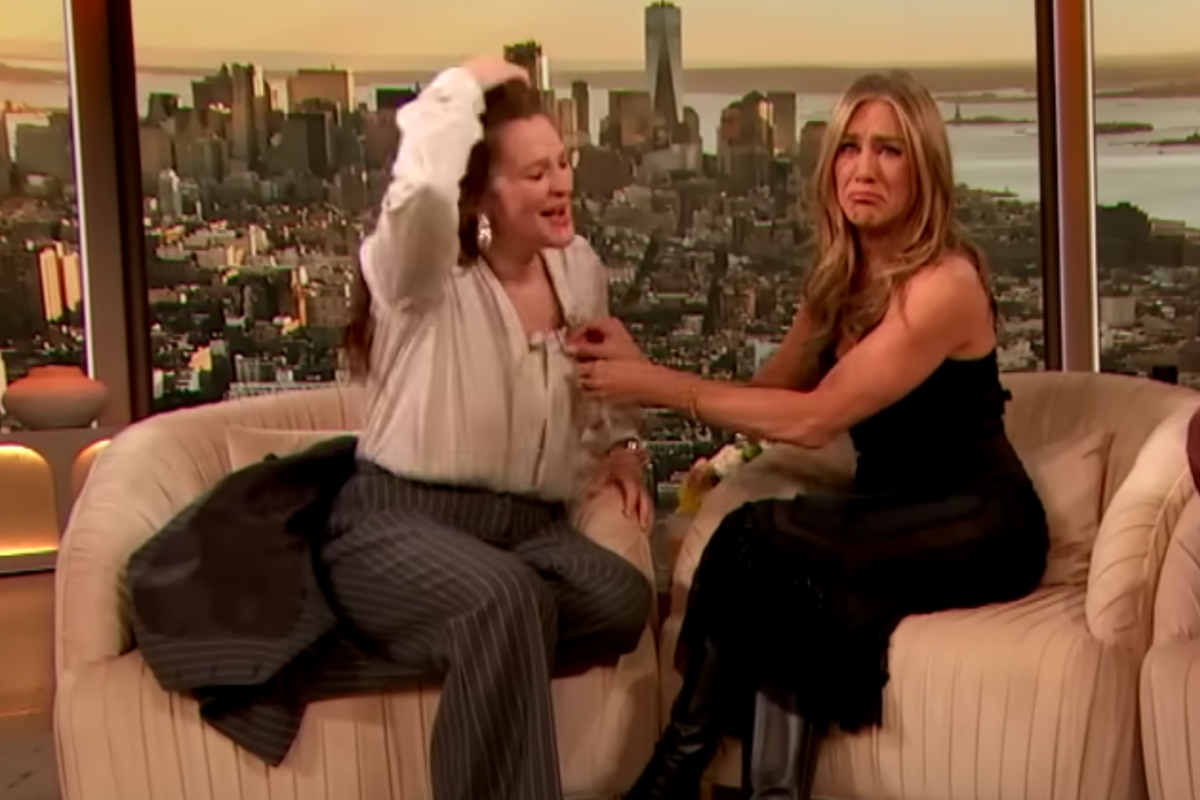People are loving Drew Barrymore's live reaction to her first perimenopause hot flash
“I don’t know that I have ever heard a celebrity talk about a hot flash in the moment. Thank you for being so real."

Drew Barrymore getting a quick assist from Jennifer Aniston
It feels safe to say that many, if not most people hail Drew Barrymore as the “Queen of Candid.” She can seemingly talk to absolutely anyone about anything in a way that’s consistently warm and authentic.
That even goes for when she experiences her first hot flash in front of a live television audience, apparently.
While speaking with guests Jennifer Aniston and Adam Sandler on her talk show, Barrymore abruptly appears flustered, fanning herself and removing her jacket.
Without missing a beat, she says, “I am so hot, I think I'm having my first perimenopause hot flashes.”“Oh, I feel so honored!” Jennifer Aniston quips as she fixes Barrymore’s mic, which is a sweet moment in and of itself.
“I’m so sorry!” Barrymore continues, laughing through it all. “Do you feel this?!” she says, placing Aniston’s hand just below her neck. “Or maybe I’m just excited!”
@drewbarrymore I either had my first perimenopause hot flash or got really exciting! Maybe both? @thedrewbarrymoreshow ♬ original sound - Drew Barrymore
Sandler, then reaching for Barrymore’s palm, assures her, “Yeah you got a hot hand.”
“Well, I’m so glad I have this moment documented!” Barrymore exclaims.
One viewer on TikTok gushed, “I don’t know that I have ever heard a celebrity talk about a hot flash in the moment. Thank you for being so real.”
Another echoed, “Drew, we have a whole generation (X) entering the change. Let’s normalize it. Just wait until you’re soaked with sweat, then cold lol.”
One person commented on the exchange between Aniston and Barrymore, noting how refreshing it was to see two “beautiful, authentic, powerful women my own age to look up to.”
Only a week prior, Barrymore had again been an unofficial spokeswoman for perimenopause when she sat down with Gayle King of “CBS Mornings” to share more of her personal experiences, including having a period “every two weeks.”
"One doctor also just told me this could last, in the worst-case scenario, 10 years. And I was like, ‘I will never make it 10 years like this!’" she told King.
@cbsmornings How did Drew Barrymore know she was in perimenopause? She tells Gayle King and Nikki Battiste one of the main symptoms she experienced. Watch their full conversation tomorrow on #CBSMornings. #drewbarrymore #gayleking #menopause #perimenopause #fertility #health ♬ original sound - CBS Mornings
Considering that every woman who lives past their 40s will probably go through at least some version of this—even earlier, for some—one would think that there should be more conversations about this pivotal life chapter. Maybe then it wouldn’t be so daunting.
Or at the very least, there might be less stigma around it. As Barrymore eloquently put it in her interview, “The way menopause has been branded is, 'You're old, you're done.' That's not it." Instead, she feels that in reality, "more women in their 40s, 50s, and 60s are looking so attractive, feeling so vibrant, living their best lives.”
Imagine that—life getting better as you grow older. What a radical thought.
This article originally appeared on 3.30.23
- Pink and Drew Barrymore get refreshingly real in intimate conversation about motherhood ›
- After causing an unexpected stir, Drew Barrymore explains why she 'doesn't need sex' ›
- Drew Barrymore and Brooke Shields discuss childhood stardom - Upworthy ›
- Woman lists 100 perimenopause symptoms in 7-minute video - Upworthy ›
- Women are totally relating to this 'Perry Menopause' skit - Upworthy ›
- Smooth sailing through menopause: natural ways to ease the transition - Upworthy ›
- 'Here Comes Menopause' Christmas parody hits home for Gen X - Upworthy ›
- Women expose the hilarious reality of perimenopausal brain fog - Upworthy ›

